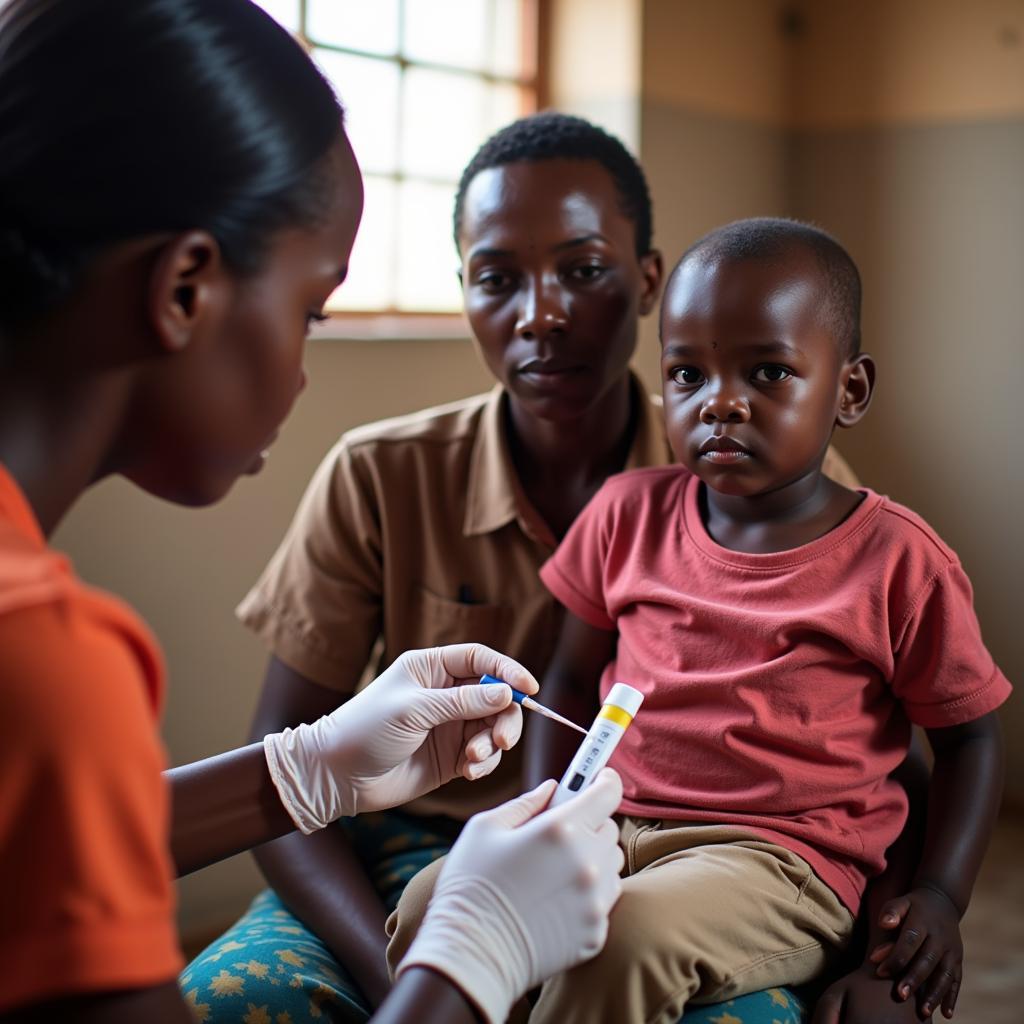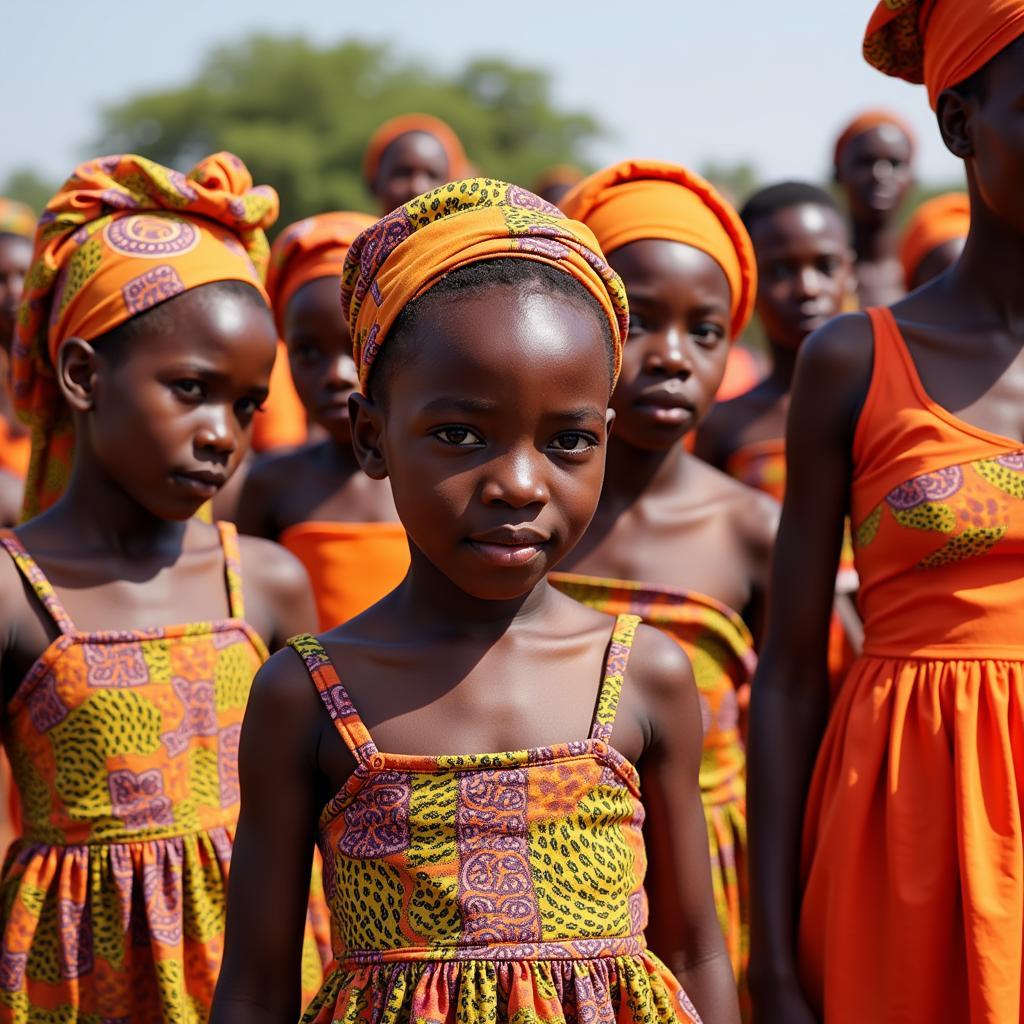Understanding and Combating African Kids Anaemia
African Kids Anaemia is a significant public health challenge affecting millions of children across the continent. This condition, characterized by a deficiency of red blood cells or hemoglobin, can have devastating consequences on a child’s growth, development, and overall well-being. Understanding the causes, consequences, and solutions to this widespread problem is crucial for building a healthier future for Africa’s children.
The Silent Burden: Causes of Anaemia in African Children
Several factors contribute to the high prevalence of anaemia among African children. Malnutrition, particularly iron deficiency, plays a major role. Diets lacking in iron-rich foods like meat, leafy green vegetables, and legumes can lead to insufficient iron stores, hindering the production of hemoglobin. Infectious diseases such as malaria, hookworm, and HIV/AIDS also contribute significantly to anaemia by causing blood loss or interfering with red blood cell production. Other factors, including genetic blood disorders like sickle cell disease and thalassemia, can also increase a child’s susceptibility to anaemia.
The Role of Malaria and Other Infections
Malaria, a mosquito-borne disease endemic in many parts of Africa, is a leading cause of anaemia in children. The parasite responsible for malaria destroys red blood cells, leading to anaemia. Hookworm infections, common in areas with poor sanitation, also contribute to anaemia by causing intestinal bleeding, resulting in iron loss.
 Malaria Test for an African Child
Malaria Test for an African Child
Devastating Consequences: The Impact of Anaemia on Children’s Health
The effects of anaemia can be far-reaching, impacting a child’s physical and cognitive development. Anaemic children often experience fatigue, weakness, and shortness of breath, making it difficult for them to participate in daily activities, including play and learning. Anaemia can also weaken the immune system, making children more vulnerable to infections. Furthermore, it can impair cognitive function, affecting school performance and long-term academic achievement. In severe cases, anaemia can even lead to heart failure and death.
The Link Between Anaemia and Cognitive Development
Studies have shown a clear correlation between anaemia and impaired cognitive development in children. Iron is crucial for brain development, and its deficiency can lead to delays in language acquisition, motor skills, and overall cognitive function. These delays can have long-term consequences, impacting a child’s educational attainment and future prospects.
Combating the Crisis: Strategies for Preventing and Treating African Kids Anaemia
Addressing the problem of anaemia in African children requires a multi-pronged approach. Improving nutrition through dietary diversification and supplementation is crucial. Promoting the consumption of iron-rich foods and providing iron supplements to at-risk children can significantly reduce iron deficiency. Controlling infectious diseases through preventive measures such as mosquito nets, deworming programs, and access to treatment is equally important. Addressing underlying genetic conditions and improving overall healthcare access are also essential components of a comprehensive strategy.
The Importance of Iron Supplementation
Iron supplementation programs have proven effective in reducing the prevalence of anaemia in children. These programs typically involve providing iron supplements to pregnant women and young children, particularly those living in areas with high rates of anaemia.
Dr. Abena Osei, a pediatrician specializing in global health at the University of Ghana, emphasizes, “Iron supplementation is a cost-effective intervention that can have a significant impact on children’s health. It’s crucial to ensure that children receive the right dosage and that programs are implemented effectively to reach those most in need.”
Conclusion: Investing in a Healthier Future for African Children
African kids anaemia is a solvable problem. By investing in comprehensive strategies that address the underlying causes of anaemia, we can significantly improve the health and well-being of millions of African children. Improving nutrition, controlling infectious diseases, and strengthening healthcare systems are crucial steps towards achieving this goal. Let’s work together to ensure that all African children have the opportunity to thrive and reach their full potential.
FAQ
- What are the common symptoms of anaemia in children?
- What foods are rich in iron?
- How can I prevent my child from getting malaria?
- Where can I get iron supplements for my child?
- What are the long-term consequences of untreated anaemia?
- Are there any home remedies for anaemia?
- How often should children be tested for anaemia?
Further Reading on African Life:
- Malnutrition in African Children
- The Impact of Malaria on Child Development
- Improving Healthcare Access in Rural Africa
Need support? Contact us 24/7: Phone: +255768904061, Email: kaka.mag@gmail.com, or visit us at Mbarali DC Mawindi, Kangaga, Tanzania.
